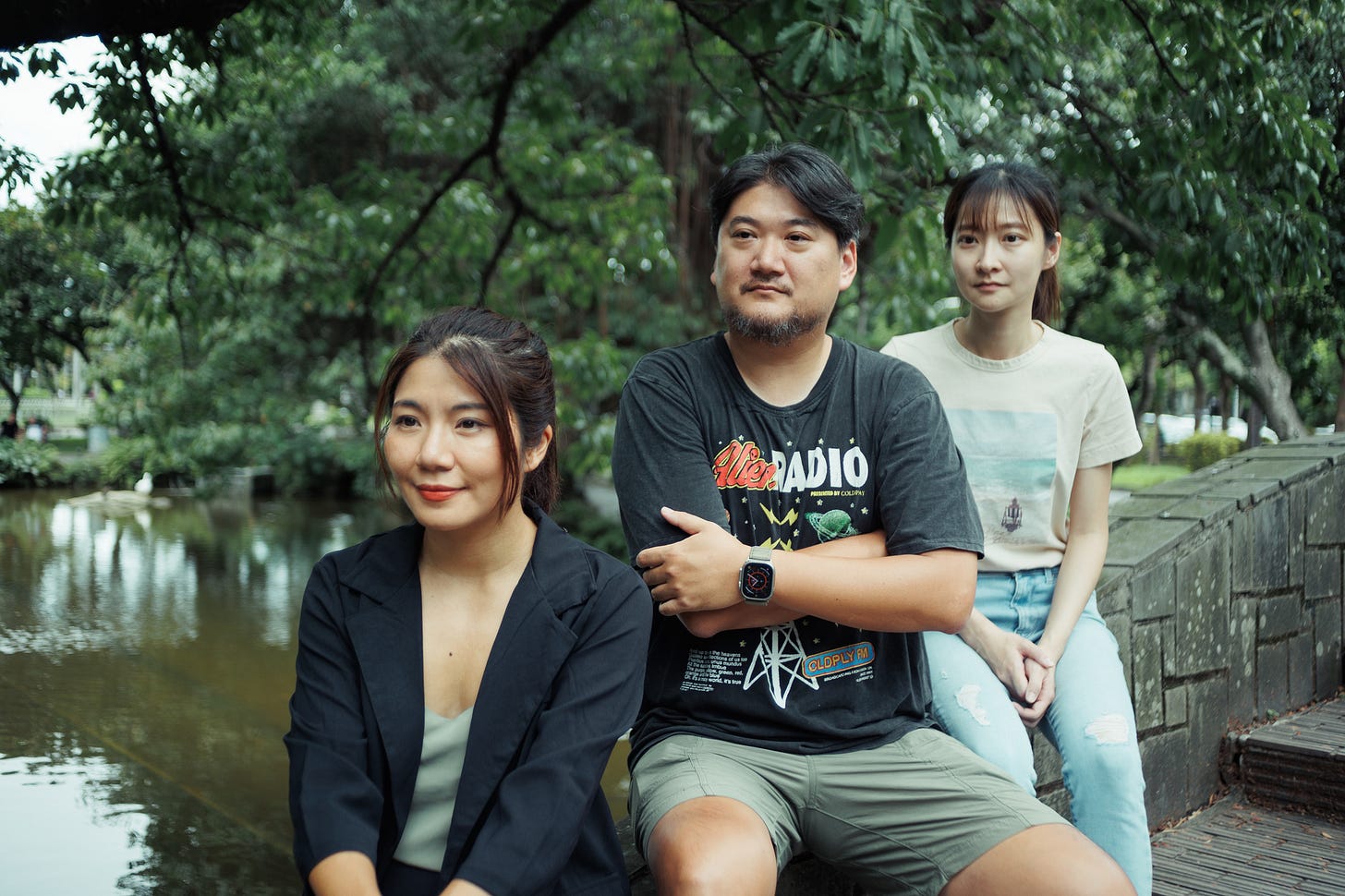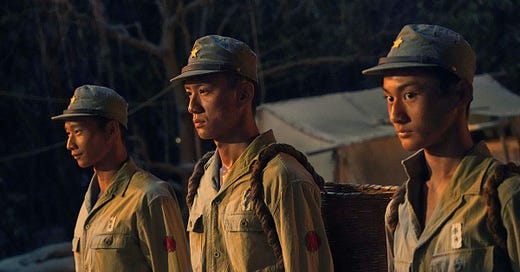Televising Taiwan’s Painful Past
What can a new Taiwanese drama, exploring the country’s complicated role as a Japanese colony during the Second World War, tell us about its media and current perceptions of its history?
Taiwan’s role in the Second World War is complicated. To this day, this historical legacy remains a hotly contested issue. At the time, the Republic of China government, which has ruled Taiwan since the war ended, was desperately resisting Japanese invasion. But the island itself had been a colony of Japan for nearly half a century. Many Taiwanese aided in the Japanese war effort — some did so willingly while others were impressed into service. Some became accessories to Japanese atrocities and war crimes while others were themselves the victims of these very acts.
According to official Japanese statistics, 207,183 Taiwanese served in the Imperial Japanese Military during the war. Around 80,000 joined the regular army toward the end of hostilities, while some 120,000 assumed non-combatant roles. How they should be remembered — and if they should be remembered at all — is a very thorny issue that defies easy explanation. But Three Tears in Borneo (聽海湧), a new suspense thriller by Taiwan’s public broadcaster PTS is trying to do just that. The plot follows three Taiwanese recruits assigned to a POW camp in northern Borneo, present-day Malaysia. The show opens with the ultimate outcome: an unspeakable massacre of Allied soldiers and Chinese civilians that survivors pin on the Taiwanese guards. The mystery is how circumstances turned these young men into war criminals.
We sat down with the show’s director Chieh-heng Sun (孫介珩) and producer Inch Lin (林佳儒) to learn more about Taiwanese history, television dramas, soft power, and more.

Lingua Sinica: How do most Taiwanese viewers interpret this period of history? Is it still considered sensitive?
Chieh-Heng Sun: Before the 1990s, Taiwanese people knew nothing about this history. There wasn’t any question of it being sensitive or not because under the decades of martial law in Taiwan from 1949 to 1987 it was impossible to talk about the Japanese period. My grandparents actually lived through the war but my parents were taught that it was as simple as the Kuomintang in China versus Japan. The Japanese were the enemies — there was no question of whether or not anyone in my family had fought for Japan. Those who did wouldn’t dare bring it up because of the White Terror and martial law. It was a forbidden subject. Martial law has been lifted for 30 years now but we still don’t know how to feel about it. A lot of viewers will watch Three Tears in Borneo and think that the stories their grandfathers told have somehow been captured on film.
People’s understanding of what Taiwan went through during the Second World War is very vague. For example, people may wonder why there was a consulate of the Republic of China in Taiwan — aren’t we the Republic of China? Why was the ROC at odds with the people of Taiwan? These are things the audience has to think about in order to understand. When we accept this historical perspective, we must also accept that most Taiwanese were Japanese at the time. Taiwan had already been a colony for 50 years. Many of our grandparents were born in Japan, and as Japanese, it was only natural for them to serve and fight for their country.
We hope that viewers will use this story to reflect on the historical context. I hope after watching Three Tears in Borneo they will be able to discuss, write down, and share their own families’ stories. By comparing their stories to the show’s plot and history books, they can finally come to a complete understanding of what their grandparents experienced.
Inch Lin: After Three Tears in Borneo started airing, I saw that a lot of viewers were finding out about this history for the first time. People came to the show out of curiosity about a story most of them hadn’t heard before. Many were sympathetic to the Taiwanese characters and this history helped them reflect on Taiwan’s present-day predicaments. I was surprised to find there were also some negative comments, too, from people who felt that the show glorified Japan and its occupation of Taiwan. Some said they refused to watch it because of this. I think it’s a shame because if they had actually watched the show, they wouldn’t have this misunderstanding. Such people just refuse to engage with this period of history in any way, though. After the series began airing I gradually came to understand how Taiwanese view this period. Some know nothing about it; others are interested, curious, and ready to sympathize with Taiwanese at the time. But others are extremely sensitive about it and refuse to touch it in any way.
LS: How about Japanese people, do they have more awareness about what they were doing in Taiwan at the time?
Sun: When we went to Japan for research, I got the impression that people seldom talked about the Imperial Japanese Army’s actions in Southeast Asia. The Japanese left behind so many horrible memories among the people of Southeast Asia but this is not often spoken about there. Japanese viewers have told us that watching Three Tears in Borneo was the first time they’d learned about this history, which wasn’t taught in school textbooks. Every country’s attitude differs when it comes to confronting the war. Germany has been much more positive about this. I think the most important thing is to ask why these things happened and how we can prevent them from happening again.
The Japanese left behind so many horrible memories among the people of Southeast Asia but this is not often spoken about there.
Lin: We worked with two Japanese actors in the show. One of them published a long post in Chinese saying that most people only know that Taiwan was once ruled by Japan but no one understands what really happened or the memories they left behind. He said he was grateful for the opportunity to act in this story since it allowed him to better understand this historical period from a personal perspective. I think this was the first time he had such an opportunity and he wanted to share that experience with more Japanese people. I asked him if he thought the series could be shown in Japan and how it would be received there. He explained that there are two schools of thought in Japan: one that refuses to touch this sensitive history for fear of damaging their national identity, and another that believes it’s important to face up to it properly and make amends. If it aired in Japan, the show would be controversial but there would definitely be an audience for it.

LS: What kind of message were you hoping to send to the wider global audience?
Sun: At its core, this is a story about relationships between people. Of course, the main character is Taiwanese, but the people who are kind to him or clash with him are from all over the world. The Allied soldiers include Britons, Americans, Australians, and Indians. The war crimes tribunal is carried out by the Allied forces as well as Japanese judges. The story is a multifaceted one, so I don’t think we necessarily have to talk about overstepping cultural barriers. There isn’t a particular message we wanted to convey to foreign audiences alone.
Lin: During the Golden Horse Film Project Promotion tour in Taipei, we met curators for a French film festival. We asked them if this kind of story would appeal to European audiences, and whether they would understand it. They said that Europe actually has many similar histories, or colonizing, being colonized, and invasion. So it’s not as though they would find it incomprehensible. In fact, when we held a screening in France viewers responded very favorably. Some said it was the first time they learned about what was happening on the other side of the world during the Second World War. I have a French friend who came for the premiere and said he loved it, even though he didn’t understand everything straight away. Afterward, he looked up a lot more information about the history. He said that if we use this angle, or tell a story instead of explaining history, we shouldn’t worry about people not understanding because they will also find the answers to their questions elsewhere.
LS: Is there anywhere our international readers can go to watch the series?
Lin: You can watch the first episode for free on PTS’s streaming platform (公視Plus). For NT$99 (US$3) you can watch all five episodes. It’s not expensive. A lot of people have asked if it will stream on Netflix, but since it was produced by PTS it’s not up to us who can buy the rights or for how much. There’s still a chance. Right now is the first wave of premieres so we’re sticking with PTS and whoever they’re speaking with, but we think it will be on more platforms in the future.
LS: What were your inspirations for using this kind of story to introduce viewers to a historical topic?
Sun: From the beginning, we wanted to do something like the HBO miniseries Chernobyl. The disaster at the Chernobyl plant was one independent event, but the fallout of the radiation continues to affect people up to the present day. It’s also the story of a group of people within a particular time frame, so I think it’s suitable for episodic storytelling. The Chernobyl disaster is a series of historical events, but the series used fictionalized characters to tie these events together. We all know that history is not objective, it is highly subjective and personal. We also used fictional characters to explore whether people made the wrong decisions, how they helped each other, and the goodwill and the evil in people. I think that the same historical event can have many different angles, and that makes it more human.

LS: What were the most challenging and most moving parts of the filming process?
Lin: Shooting this kind of material means working with a relatively large budget. But finding that investment is not easy. It began as one film then became a four-episode limited series and was later extended to five episodes. The costs kept adding up and because of limitations on our resources, we had to justify every dollar spent. One of the difficulties we had was finding a consultant for the Australian Army. When you’re making a historical drama like this, everyone expects everything to be 100 percent accurate, so the whole production was about five to ten times more difficult for me than other projects.
Sun: I think that the hardest thing was, of course, how to present the story in its entirety. There’s a lot we can just make up but we hope for everything to be based on facts. There are so many channels for people these days to absorb information, and if one thing isn’t right it’s easy for the audience to lose interest. Our actors worked so hard for this show, be they Taiwanese, Australian, or Japanese. From their facial expressions to movements and the language they used, they tried to make themselves seem like a person from 80 years ago. Since they worked so hard, the sets and artistic considerations are just to let the viewers appreciate their performances.
Lin: Soon after the casting of our main characters, production was suspended due to the Covid-19 pandemic. Actors were paid very little but always said how lucky they were to be part of this production. It’s rare to find a troupe of actors who are so kind-hearted and supportive of the production. We on the production side felt very lucky too. Even though the process was difficult, we were so excited about it. Seeing the end result, I feel fortunate to have worked on this drama. As the person who put this team together and then finally finished it, hearing this kind of feedback is more touching than the drama itself.
Sun: As the director, I think that the actors were very committed. The dedication of the actors contributed a lot to the details of the series. For example, there are many fighting scenes. The characters fighting will be thrown to the ground, and the action director will help the actors put on protective gear and teach them how to fall properly. But that gear isn’t all-encompassing and the floors in the POW camp are hard. Every time we shoot an action scene, though, we’ll find our colleagues on the ground at night with headlamps, using a small sieve to remove any sharp stones from the sand. This takes hours to do. If you think that details in the show are done well, this was thanks to support from the whole staff.
Lin: I once overheard a few of the actors chatting and they said that they had waited so long and worked so hard to finally find a script as good as this one, a role as good as theirs. They said they didn’t feel tired at all because of how long they’d been waiting to do something like this. I was very moved when I heard that, that everyone believed in what we were doing so much. I knew this sentiment would be reflected in the quality of the series itself.
LS: Taiwan wants to be seen more by the rest of the world but the country’s soft power exports haven’t seen the same access as some of its neighbors. What more do you think can be done?
Lin: It’s true that Taiwan’s entertainment industry doesn’t have the same star power as somewhere like Korea, and this has a lot to do with the overall culture. I often feel that Taiwan is not willing to expend resources on cultivating stars, which takes a lot. In Taiwan people achieve fame and popularity overnight and then everyone wants them all of a sudden. We don’t get the kinds of stars who are raised by management companies over a long period of time, like you do in Korea or Japan. Taiwan is more concerned with speculating on short-term gains than investing in the long-term.
Taiwan is more concerned with speculating on short-term gains than investing in the long-term.
Sun: It’s very important to have a workflow. If you’re making a film in Taiwan, you’ll probably find that there are some dramas where the script is changed as they’re filming, or the script isn’t ready until right before they start filming. Before the script is ready, though, it’s hard to imagine how to move on from there. It’s like moving on just for the sake of moving on, not in order to make a good production. I think that sometimes we don’t have a good story but it’s not for lack of creativity or because our scriptwriters aren’t good enough. It’s because the workflow isn’t leaving space for a good story to emerge. A good story has to be carefully crafted and discussed by a lot of people — you can’t just make it up as you go along.
LS: Some of our readers may not have watched any Taiwanese dramas before. Which series would you recommend most?
Sun: Gold Leaf (茶金).
Lin: Copycat Killer (模仿犯) and Mad Doctor (村裡來了個暴走女外科) are both great as well, but my number one recommendation would also be Gold Leaf.
LS: Finally, what do you want the audience to take away from Three Tears in Borneo?
Sun: Many people in Southeast Asia, not just the Chinese, have a negative view of the Japanese because of the losses they suffered during Japan’s invasions and occupations of their countries. We could see this when we went to Borneo, in various texts and images, and in the records of their museums. Through this, I think the audience can better understand the situation for Taiwanese at the time. Taiwan wasn’t a country of its own then but a colony under long-term rule by Japan. When Taiwanese were sent to places like Borneo they had to carry out the orders of the Japanese. I hope this story helps people throughout the region better understand the special position Taiwanese were in during the Second World War.
Lin: My intention is to broaden people’s horizons and enhance mutual understanding. When we looked at this period of history, we knew that we had to be as objective as possible and not favor one side because each person was a living individual with their own considerations. No one is absolutely good or absolutely evil. Can we put aside our hatred when we look back at events 80 years ago? Wars break out when one side has an opposing view and wants to convince the other side, so they attack the other side in order to convince them. History keeps repeating itself because people are unwilling to understand others. I hope the audience will see that many things are not as they appear to be. I want to convey how important understanding is.
No one is absolutely good or absolutely evil. Can we put aside our hatred when we look back at events 80 years ago?
Sun: To add to what I just said about objectivity, storytelling is indeed subjective to a certain extent — that is, whose perspective we choose to tell and what kind of story we tell. Of course, this is a story about the Second World War from the perspective of the Taiwanese people, but I think what we have done is show the subjectivity of everyone else as well, not just the Taiwanese. In fact, apart from the Taiwanese viewpoints, we have actually presented the different positions and viewpoints of the Japanese and the Allied Forces. It is precisely for this reason that the conflict comes out in this drama. The audience will find it very difficult to figure out who is right and who is wrong.








It is always challenging to track the political and cultural progress of a place from afar, which for Taiwan is magnified by distance and strategic marginalization by China. But what this movie shows, and it is a universal message I think, is that we are often unaware of or inured to even our own stories. Movies not only bring us to awareness of these stories, but guide us to thinking about what to make of them. Thanks for this fascinating interview. I can’t wait to watch.